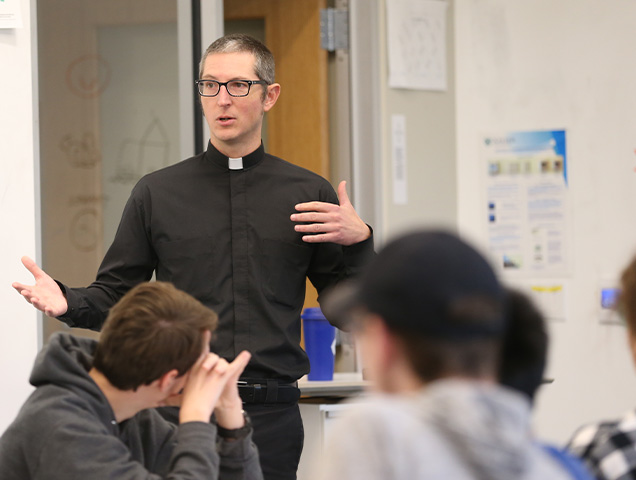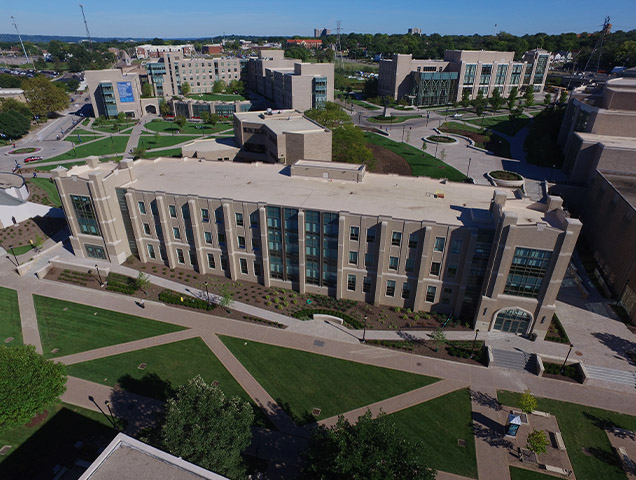Teaching Integrated Science (Grades 7-12)
Program Details
As a teaching integrated science major, you’ll gain the knowledge and skills needed to teach science at the junior high and high school levels (grades 7-12).
The teaching integrated science major includes courses in the four science disciplines (biology, chemistry, physics and earth science) as well as courses that cover the latest in education practices. In this major, you’ll choose one science area as a concentration while also learning about the other disciplines. You’ll also learn methods for organizing lesson plans, enhancing classroom time with experiments and assigning tests and homework.
Xavier University’s education programs are designed to prepare students for licensure and/or certification in the state of Ohio. Upon graduation, you’ll be prepared to pass Ohio’s Educator License Assessment for Integrated Science. Xavier’s School of Education is fully accredited by the Ohio Department of Education and the Council for the Accreditation of Educator Preparation.
Degree Awarded
Bachelor of Science in Teaching Integrated Science
Concentrations
Life Sciences, Chemistry, Physics
Curriculum
The sample course sequence below illustrates class offerings for the Teaching Integrated Science (Grades 7-12) major. Consult the official Xavier University course catalog for detailed registration and advising information.
STEM and Education Courses: 28-29 Required Credit Hours
- BIOL 160: General Biology I............ 3cr.
- BIOL 161: General Biology I Lab............ 1cr.
- BIOL 162: General Biology II............ 3cr.
- BIOL 163: General Biology II Lab............ 1cr.
- CHEM 160: General Chemistry I............ 3cr.
- CHEM 161: General Chemistry I Lab............ 1cr.
- CHEM 162: General Chemistry II............ 3cr.
- CHEM 163: General Chemistry II Lab
- PHYS 116: Our Universe: The Earth ............ 2cr.
- PHYS 117: Our Universe: The Earth Lab............ 1cr.
- BIOL 120: Life: Ecology and People............ 2cr.
- BIOL 136: Life: Ecology and People Lab............ 1cr.
- BIOL 260: Intro to Environmental Science............ 3cr.
- BIOL 261: Intro to Environmental Science Lab............ 1cr.
- PHYS 118: Our Universe: The Sky............ 2cr.
- PHYS 119: Our Universe: The Sky Lab............ 1cr.
- MATH 156: General Statistics............ 3cr.
- MATH 146: Biostatistics............ 3cr.
- EDMS 131: Professional Education............ 3cr.
- EDFD 110: Human Development and Learning............ 3cr.
- EDSP 200: Special Education: Identification and Issues............ 3cr.
- EDSP 380: Classroom Management............ 3cr.
- EDMS 332: Meth/Curr/Asmt in Science............ 3cr.
- EDMS 350: Technology and Topics for Educators............ 3cr.
- EDMS 411: Clinical Experiences ............ 1cr.
- EDRE 471: Content Area Literacy............ 3cr.
- EDMA 470: Student Teaching AYA............ 9cr.
31 Credit Hours Required
- BIOL 102: Life: Human Biology............ 2cr.
- BIOL 132: Life: Human Biology Lab............ 1cr.
- BIOL 230: Genetics............ 3cr.
- BIOL 231: Genetics Lab............ 1cr.
- BIOL 240: Evolution............ 3cr.
- BIOL 250: Ecology............ 3cr.
- BIOL 251: Ecology Lab............ 1cr.
- BIOL 497: Experimental Biology Lab............ 2cr.
- CHEM 240: Organic Chemistry I............ 3cr.
- CHEM 241: Organic Chemistry I Lab............ 1cr.
- MATH 140: Concepts of Calculus............ 3cr.
- PHYS 160: College Physics I............ 3cr.
- PHYS 161: Introductory Physics Lab I............ 1cr.
- PHYS 162: College Physics II............ 3cr.
- PHYS 163: Introductory Physics Lab II ............ 1cr.
31 Credit Hours Required
- BIOL 240: Evolution............ 3cr.
- CHEM 240: Organic Chemistry I............ 3cr.
- Chem 241: Organic Chemistry I Lab............ 1cr.
- CHEM 242: Organic Chemistry II............ 3cr.
- CHEM 243: Organic Chemistry Lab II............ 1cr.
- CHEM 226: Quantitative Analysis............ 3cr.
- CHEM 227: Quantitative Analysis Lab............ 1cr.
- MATH 140: Concepts of Calculus............ 3cr.
- PHYS 160: College Physics I............ 3cr.
- PHYS 161: Introductory Physics I Lab............ 1cr.
- PHYS 162: College Physics II............ 3cr.
- PHYS 163: Introductory Physics II Lab............ 1cr.
- BIOL 497: Experimental Biology Lab............ 2cr.
- CHEM 220: Principles of Physical Chem............ 3cr.
26-30 Credit Hours Required
- BIOL 240: Evolution............ 3cr.
- MATH 180: Differential Calculus............ 3cr.
- MATH 181: Integral Calculus............ 3cr.
- PHYS 170: University Physics I............ 3cr.
- PHYS 171: Explorations in Physics I............ 1cr.
- PHYS 172: University Physics II............ 3cr.
- ENGR 173: Explorations in Engineering............ 1cr.
- PHYS 330: Modern Physics I............ 3cr.
- PHYS 331: Modern Physics Lab ............ 1cr.
- PHYS 242: Circuit Analysis............ 3cr.
- PHYS 243: Circuit Analysis Lab............ 1cr.
- ENGR 342: Material Science............ 3cr.
- PHYS 355: Advanced Physics Lab............ 2cr.
- PHYS 395: Physics Research............ 3cr.
- PHYS 398: Physics Thesis............ 1cr.
Sample Courses
BIOL 120: Life: Ecology & People
2 Credit Hours
An exploration of critical environmental issues that affect our world today, through a study of ecological principles and their interaction with human society, especially considering the ethical, political, and economic aspects.
ENGR 173: Explorations in Engineering
1 Credit Hour
This hands-on course is designed to enable students to gain basic engineering experimentation and measurement skills. It provides exposure to fundamental concepts like vibrations, frequency spectra, material constants, electric currents and digital logic. In a project, students develop and conduct an experiment that is aimed at answering a scientific or engineering question in a field of their interest.
EDMS 470: Student Teaching
9 Credit Hours
A weekly seminar and daily laboratory experience in secondary school teaching under a licensed master teacher. Prior to registration, the student must make a formal application by the stated deadline and meet the GPA and other requirements on file in the Education Department.
Student Clubs
The following clubs are popular choices for students in the teachin integrated science major
Educators for Justice
Educators for Justice's members meet monthly to foster spiritual, intellectual, and moral growth through professional development, service, and community building. It's a great way for education majors and minors to get to know the professional education community in Cincinnati.
Embrace Evanston
Embrace Evanston members lead after school programs at Evanston Academy, a local elementary school in our neighboring community. The mission of the group is to address educational inequality in our community through mentoring, tutoring and physical activity.
Alchemyst Club
Ever been to a liquid nitrogen ice cream social? This club is made up of chemistry enthusiasts who love to experiment and discuss the ins and outs of the study of matter.
Biology Club
The Biology Club welcomes anyone and everyone who is interested in biology. Past events have included hiking trips, Break Out Games, scavenger hunts and trips to the zoo and aquarium.
When we seek something more, we become something greater.
Find more information about how you can become a Musketeer.
Request InformationCincinnati: A City of Opportunity

Cincinnati, Ohio is ranked the #1 Best City for College Graduates (smartasset.com) and the #15 Best Place to Start a Career (WalletHub). Xavier has long-term partnerships with over 50 regional school districts where students are placed for classroom observations and student teaching starting freshman year.
What is Jesuit Education?

A Xavier education is more than your typical college experience. Drawing on a Jesuit Catholic educational model 400 years in the making, students get the personal attention and support they need to succeed. The result is an education that’s as encouraging as it is challenging, and as enriching as it is demanding.
Xavier Rankings and Recognitions

Xavier University has been ranked among the top 10 best Midwest Regional Schools by U.S. News & World Report for the past two decades. The Princeton Review names it one of the "Best 385 Colleges in America." Explore how Xavier’s top-ranked academic programs continue to distinguish themselves among the nation’s best.
Graduate With Honors
Are you looking for an academic challenge? The University Scholars Honors Program offers incoming students a more challenging curriculum and close support from professors while completing their undergraduate degree. Acceptance into the program is highly selective and includes a $2000 travel grant.
Teaching Integrated Science (Grades 7-12) Major at Xavier University
The undergraduate program in teaching integrated science is designed to lead to an Ohio teaching license. Students also complete a content area as their concentration and are awarded a Bachelor of Science. The teaching integrated science program is approved by the Ohio Department of Higher Education, and its licensure is approved by the Ohio Department of Education. All programs are accredited by the Council for the Accreditation of Educator Preparation (CAEP).
Xavier University's College of Professional Sciences prepares undergraduate and graduate students intellectually, morally and spiritually for careers and professions of service. CPS challenges students to strive for academic excellence and life-long learning through promoting collaboration and community partnerships, and incorporating research, scholarship and innovation.
Xavier University is a private university located in Cincinnati, Ohio, providing a liberal arts education in the Jesuit Catholic tradition. Founded in 1831, the University is the sixth-oldest Catholic university in the nation. It has been ranked among the top 10 master's-level universities in the Midwest by U.S. News & World Report for the past two decades. The Princeton Review names it one of the "Best 385 Colleges in America."